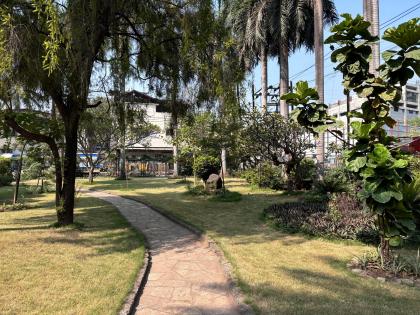NatConnect Moves NGT to Halt Commercial Development on Green Pawane Plot in Navi Mumbai
By Amit Srivastava | Updated: November 26, 2024 16:07 IST2024-11-26T15:59:05+5:302024-11-26T16:07:05+5:30
NatConnect Foundation has filed an application with the National Green Tribunal (NGT) to stop the Maharashtra Industrial Development Corporation ...

Environmental Group Fights to Protect 3,600 Sq Mtr Open Space in Navi Mumbai
NatConnect Foundation has filed an application with the National Green Tribunal (NGT) to stop the Maharashtra Industrial Development Corporation (MIDC) from permitting commercial development on a 3,600-square-meter open space (OS-7) in Pawane, Navi Mumbai. The plot, home to over 200 trees, has been allotted to a project-affected person (PAP) for constructing a hotel and lodging facility.
According to NatConnect’s director, B N Kumar, this move violates MIDC’s own Comprehensive Development Control & Promotion Regulations (CDCPR), which restrict the use of open spaces to civic amenities such as kindergartens, gyms, libraries, or utility services like water tanks. “Commercial construction is prohibited in designated open spaces, and allowing this would set a dangerous precedent,” Kumar argued in his plea to the NGT’s western zonal bench.
The land, initially leased to a chemical company in 2000 for tree plantation, has been a crucial green buffer in the heavily industrialized area. Kumar highlighted that the plot’s 200 trees help mitigate air pollution and protect nearby residential zones from the adverse effects of industrial emissions.
While acknowledging the need to rehabilitate PAPs, NatConnect has requested that the PAP be relocated to a different site to ensure the green patch remains intact. “The destruction of this green space would not only result in the felling of 34 trees initially but also jeopardize the entire plantation, wiping out decades of environmental gains,” Kumar added.
NatConnect’s application also cited legal precedents, including Supreme Court and Bombay High Court judgments that bar the conversion of open spaces for construction. These rulings underscore the constitutional right to a healthy environment as part of the right to livelihood under Article 21 of the Constitution.
The environmental watchdog also noted inconsistencies in MIDC’s approach. While the leaseholder was informed in January 2024 about the plan to reclaim the land for PAP rehabilitation, MIDC’s decision to reverse the purpose of this green space violates the long-standing policy of maintaining open spaces in industrial layouts.
NatConnect emphasized that such green belts are critical for urban sustainability, especially in chemically polluted areas like Pawane. The NGT’s decision will likely serve as a precedent for the protection of green spaces in urban and industrial zones.
Open in app